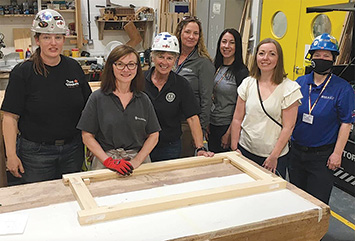By LINDA JARRETT
Correspondent

– Photo courtesy of Cindy Frank
Four Missouri tradeswomen traveled to London to participate in the 2022 Tradeswomen Building Bridges (TBB) conference to inspire more women in the United Kingdom and internationally to build careers in the construction trades.
They were among nearly 50 delegates from North America who represented the diversity of women working in construction at the event, which was held June 11 to 21.
The Missouri tradeswomen included:
- Cindy Frank, a Carpenters Local 945 retiree from Jefferson City and past president of her union. Frank, a board member of Missouri Women in Trades, is well-known among tradeswomen in the St. Louis area for her volunteerism.
- Kelly McCellen, a member of Operating Engineers Local 101 in Kansas City, Mo.
- Jessica Podhola, a member of Painters Local 820 in Kansas City, Mo.
- Emily Snyder, a member of IBEW Local 124 in Kansas City, Mo.
The goal of the conference was to share knowledge and build connections for future collaboration. The group also aimed to galvanize support for greater inclusion of women in the construction sector and to express solidarity with women training and working in the industry.
SOLIDARITY, BEST PRACTICES
“Tradeswomen Building Bridges is a global effort to unite tradeswomen in solidarity,” said Frank who also served on the delegation’s logistics team, helping to plan the event. “In the United States, the number of women in the building trades has, in some areas, grown to 10 percent or higher. We were trying to share those best practices in London because women represent less than one percent of the construction workforce there.”
During the conference, hosted by the University of Westminster which has been leading the way for research into women in construction since the 1990s, delegates were able to invite stakeholders in the London area, contractors, educators and policymakers to hear best practices that TBB has been doing in the United States.
INCLUSION, EQUALITY
Frank said that unions in the United States, women are given equal opportunity. She explained that there is inclusion and equity in the states and women are paid the same wages as their male counterparts because it’s a union scale.
“In London, we found that the union was not as strong because everyone is hired by the city and its social housing, so they don’t have as much equality as we do here because everybody is fighting their own battle,” she said.
Frank said that some areas of Canada, like New Brunswick, have equality.
“Canadian apprenticeship has equity, and they’re getting their numbers up also,” she said. “Their main leader is pro-union, and they have benefitted in the past few years because he is pushing for skilled trades and apprenticeships, and that opens the door for women because they don’t deny them.”
EUROPEAN HIRING PRACTICES
Some European countries are relatively close to the United States regarding hiring practices and the trades.
“The ones like Builders Woodworkers Association, Sheet Metal Air Rail Transportation, painters and those affiliated with those groups are doing the work for everyone in European countries because they’re the unionized group,” Frank said.
HOLLOWAY PRISON
Hosted by the Islington Council, the group could see places unavailable to most people and tourists like Holloway Prison, the largest women’s prison in western London until it closed in 2016.
Recently, it has become a source of health and human services for women who have slipped through the cracks in society. TBB has partnered with Reclaim Holloway to establish a women’s building to honor Holloway’s legacy. The site is currently in the process of becoming a housing development.
“The prison was a huge success because we were able to join apprenticeship programs with the city, which is building this new housing development,” Frank said. “They have committed to 51 women apprentices.
“We were able to show the council how that’s possible. It was a good experience for them to see 44 women who could run the equipment, build the building and were willing to make the trip to help them see how that would work.”
LABOR SHORTAGE IN GREAT BRITAIN
Great Britain also has a labor shortage, and statistics prove that not only can women do construction work but also that there are women who want the work.
“One of the apprenticeship schools said that they have many women come through, and the council didn’t even know where to get the women to do this,” Frank said. “We were able to connect them with these schools.”
McClellen, who also served on the delegation’s logistics team, said delegates were able to meet the contractors, apprenticeship programmers and government officials to share information.
HELPING OTHERS
“What I got out of it personally was the gratification of knowing that what we’ve done has helped others,” she said. “I know that one tradeswomen group formed while we were there, if not two.”
McClellan said that while London unions work differently than the United States, they do have the same protections. “They have something similar to an AFL-CIO, and anybody can be a member of the union and use it for their benefit,” she said.
The countries represented at the London delegation included the United States, Canada, Sweden, Ukraine, England and Norway.


